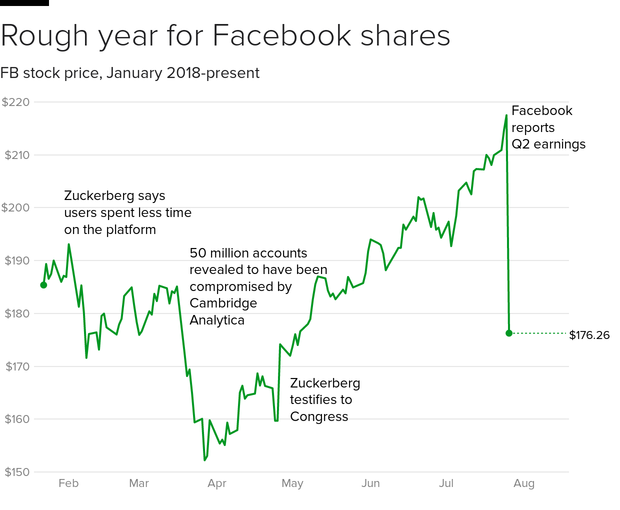Facebook Stock Suffers Largest 1-Day Drop In History, Shedding $119 Billion
<p>Facebook lost about $119 billion of its value on Thursday, marking the biggest one-day loss in U.S. market history. </p>Thursday, July 26th 2018, 6:58 pm
Facebook lost about $119 billion of its value on Thursday, marking the biggest one-day loss in U.S. market history.
The company's shares plunged $41.24, or almost 19 percent, to $176.26 a day after the social media giant reported disappointing results. The slide is the largest decline in market capitalization in history, exceeding Intel's $91 billion single-day loss in September 2000, according to Bloomberg data.
Founder and CEO Mark Zuckerberg saw his fortune drop by $15.9 billion to roughly $71 billion. His personal loss alone, if only on paper, exceeds the value of companies such as Molson Coors and Macy's, which have market values of $14 billion and $12 billion, respectively.
Investors were spooked by Facebook's forecast showing that its number of active users is growing less quickly than expected, while the company also took a hit from Europe's new privacy laws.
The report, which marked Facebook's first full quarter since the Cambridge Analytica scandal, startled investors with a bevy of red flags about setbacks to its revenue and user growth. Indeed, the drop Thursday morning was sharper than the multi-day stock slide in March following revelations of data misappropriation by Cambridge and others. (Facebook shares dropped 17.8 percent then, bottoming out at $151.65 on March 28.)
"The perceived narrative surrounding Facebook has changed after yesterday's earnings announcement," said Jeff Henriksen, managing partner at Thorpe Abbotts Capital. "The market seems to be questioning the quality of growth seen in the past."
The share collapse merely returned Facebook shares to a level last seen in early May, a sign of just how bullish investor expectations had been running. At that time, the stock was still recovering from an earlier battering over a major privacy scandal.
Facebook is hardly a stranger to a volatile stock price and has rebounded from previous mishaps, including Cambridge Analytica. While several analysts downgraded the stock, others say they still have faith in the company to grow over the long-term.
"Even the best hitters strike out sometimes," wrote Wedbush analyst Michael Pachter, who lowered his 12-month price target to $250 from $275, in a research report. "In our view, the sell-off is overdone and largely unwarranted."
Still, investors weren't prepared for many of the bombshells dropped by Facebook Chief Financial Officer David Wehner.

A hit from Europe
European advertising revenue growth in Europe "decelerated more quickly than other regions," partially because of the new European privacy laws, Wehner said. That surprised investors because of the belief that the new laws wouldn't hurt revenue.
The new laws were only in effect for one month of the quarter, which means the company may feel more of an impact in the current quarter. The new regulations are also affecting user growth in the region because of the impact of requiring consumers to opt-in to Facebook and to linking their accounts to third-party websites, Pachter said.
"The implementation of GDPR gave a large number of Facebook users control over their privacy, and it should have been patently obvious to investors (and to us) that allowing users control would result in slightly lower engagement," he noted, alluding to Europe's General Data Protection Regulation privacy rules.
Over the long term, GDPR may end up favoring Facebook and other large companies that have the resources to adapt to new requirements. They could similarly disadvantage smaller, lesser known companies that don't have the resources to comply and which could face big fines if they don't.
Instagram worthy?
Some investors were also dismayed with Facebook's revelation about Instagram Stories, which allow users to post videos or photos that disappear after a day. Like Facebook, Instagram depends on ads to generate revenue, and Stories is supposed to help sell more ads.
But Wehner said the product has "lower levels of monetization," while adding that the company plans to invest in growing the service. "That's going to have a negative impact on revenue growth," he noted.
Profitability woes
Facebook has drawn investors because of its fast growth of users and profits. Yet both categories are facing headwinds. In case of the latter, Wehner noted that "total expense growth will exceed revenue growth in 2019," pushing down operating margins.
Investors closely watch operating margins because they serve as an important metric for profitability. The lower the operating margin, the less profitable the business. Facebook warned that its operating margins would fall from its current 44 percent to the "mid-30s."
User growth was "lackluster," Pachter noted.
So is it time to unfriend Facebook? Some analysts argue that its long-term outlook is favorable, with RBC Capital Markets' Mark Mahaney writing that the sell-off may represent "one of the best entry points you can get on FB," according to Bloomberg.
And in the view of BTIG analyst Rich Greenfield, Facebook is making an investment that will pay off down the road.
"Facebook is actively choosing to make less money, deprioritizing near-term monetization to drive engagement to even higher levels to capture even more of their 2.5 billion monthly users' time and attention," he wrote. "Legacy media executives... should not be rejoicing -- they should be afraid, very afraid."
-- The Associated Press contributed to this report
More Like This
November 13th, 2024
October 28th, 2024
October 17th, 2024
Top Headlines
December 26th, 2024
December 26th, 2024
December 26th, 2024
December 26th, 2024









